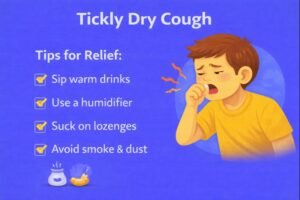Tickly Dry Cough: First Aid Awareness and Comfort Tips in Canada
What Is a Tickly Dry Cough?
A tickly dry cough is a non-productive cough, meaning it does not bring up mucus or phlegm. It often feels like a light irritation or “tickle” in the throat that triggers repeated coughing. In many cases, this type of cough is linked to environmental irritants, seasonal allergies, or the lingering effects of a mild cold, rather than a serious illness.
Why Dry Cough Awareness Matters in Canadian Homes and Workplaces
Across Canada, dry indoor air during winter, dust exposure, strong scents, and outdoor pollen can all irritate the throat. First aid awareness focuses on recognizing common triggers, supporting throat comfort, and reducing exposure to irritants, rather than diagnosing disease. Early awareness helps people stay comfortable and maintain sleep and daily routines.
A Simple, Realistic Scenario
An office employee develops a light, persistent throat tickle during the heating season. Remembering basic first aid awareness, they increase water intake, adjust the desk humidifier, and take short breaks outdoors for fresh air. The cough gradually settles.
Common Signs and Features

-
Repeated short coughs without mucus
-
Throat irritation or scratchy sensation
-
Coughing that worsens at night or in dry air
-
Mild voice hoarseness after frequent coughing
-
Temporary sleep disruption
Symptoms often improve when the throat is soothed or environmental triggers are reduced.
Possible Contributing Factors
Several everyday conditions can lead to throat irritation:
-
Dry air or indoor heating
-
Dust, smoke, or strong fragrances
-
Post-nasal drip from mild allergies or sinus irritation
-
Cold air exposure during outdoor activity
-
Talking or singing for long periods without hydration
Identifying patterns—such as season, location, or air quality—can help reduce recurrence.
First Aid Awareness and General Comfort Measures
From a public-education perspective, the emphasis is on moisture, rest, and gentle throat care:
-
Sip water regularly to keep the throat moist
-
Use a humidifier in very dry indoor environments
-
Take breaks from speaking if the throat feels strained
-
Choose warm, soothing beverages such as lemon water or mild herbal teas
-
Consider a small spoonful of honey for throat comfort (for adults and older children)
-
Avoid smoke, heavy dust, and strong scents when possible
These simple steps often ease irritation and reduce the urge to cough.
Prevention and Everyday Considerations in Canada
-
Maintain comfortable indoor humidity levels during winter
-
Ventilate rooms after cleaning or using strong products
-
Check pollen or air-quality forecasts before outdoor exercise
-
Stay hydrated during work shifts, travel, or physical activity
-
Practise good hand hygiene during cold and flu seasons
Such habits support overall throat comfort in offices, classrooms, and active settings.
Frequently Asked Questions About Tickly Dry Cough
Is a dry cough always a sign of illness?
Not necessarily. Many dry coughs are linked to air quality, dryness, or mild irritation rather than infection.
Why is it worse at night?
Dry air and lying flat can make throat sensations more noticeable during rest.
Does hydration really help?
Yes. Fluids help keep throat tissues moist and may reduce the urge to cough.
Are warm drinks useful?
Warm beverages can feel soothing and may temporarily ease throat irritation.
When should a cough be checked further?
If it persists for several weeks, becomes painful, or is accompanied by unusual breathing difficulty, further assessment is advisable.
Educational Note
This article is intended for general public and workplace education in Canada. It supports awareness of common dry cough triggers and first aid recognition but does not replace evaluation or care from qualified healthcare professionals.
